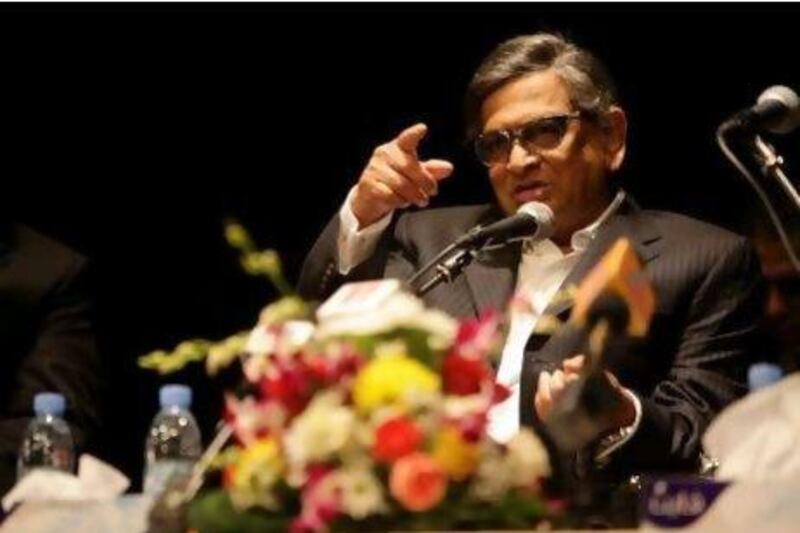ABU DHABI //India's external affairs minister has urged welfare groups to pay particular attention to the most "vulnerable" groups of Indian expatriates living in Gulf countries.
At a meeting at the Indian Embassy in Abu Dhabi last night, SM Krishna asked diplomats to dedicate one or two hours every week to listen to - and help solve - the problems of distressed workers.
"Welfare officers should be easily accessible to Indian expatriates and must respond quickly to their requests," he said. "An open day should be held every week to address their problems."
Hundreds of workers gathered at the embassy last night to hear Mr Krishna, who is on a three-day trip to the Emirates.
"I would like you to pay special attention to the most vulnerable among our expatriates," he said. "You should be mindful of the yeomen services rendered by these Indian expatriates."
The UAE is home to more than 1.75 million Indian expatriates, the largest community of overseas workers in the Emirates.
On Sunday, Mr Krishna met Indian envoys to discuss a range of issues relating to India's core interests in the region, including energy security, the expatriates in the Gulf and regional developments.
He paid tribute to the thousands of men and women working in the region. "[The] Indian workforce is most sought after in the Gulf countries. It is heartening to find Indian workers are preferred over others," he said. "They are making a tremendous contribution to the prosperity of the region.
"We appreciate the generosity of the governments in the Gulf countries in accepting the workers and protecting and safeguarding them.
"It is the magnanimity of the governments in Gulf countries that has enabled so many Indians to come and work here.
"Gulf countries matter to India much more as a region because of the fact that millions of Indians have been working here. [The] government of India attaches high importance to expatriates."
Mr Krishna said Indian workers were not only enriching the countries in which they were working, but were helping their homeland's economy through remittance payments sent back every month.
"It's a monumental effort," he said. "The country can never forget this assistance of millions of Indians in the Gulf."
During a question-and-answer session, the minister addressed the issue of Sri Lanka's Tamils.
He said the Indian government was undertaking a number of welfare measures to help the displaced citizens.
This included help to build homes and railway tracks, and through the donation of money to the government to help the people.
Meanwhile, the Indian Ambassador to the UAE, MK Lokesh, told those assembled at the embassy that a pension scheme to rehabilitate workers when they returned home would soon be implemented.
"Some money would be contributed by the government and some by the workers," he said. "It would benefit [the] expatriated when they return home."
He added that web-based attestation, launching on May 1, would help workers avoid being cheated.
Mr Krishna is expected to meet the Foreign Minister, Sheikh Abdullah bin Zayed, today and preside over the tenth session of the India-United Arab Emirates Joint Commission for Technical and Economic cooperation.
A press release by India's external affairs ministry said that the country's bilateral trade with the UAE in 2010-2011 was estimated at US$67 billion and was likely to increase.







